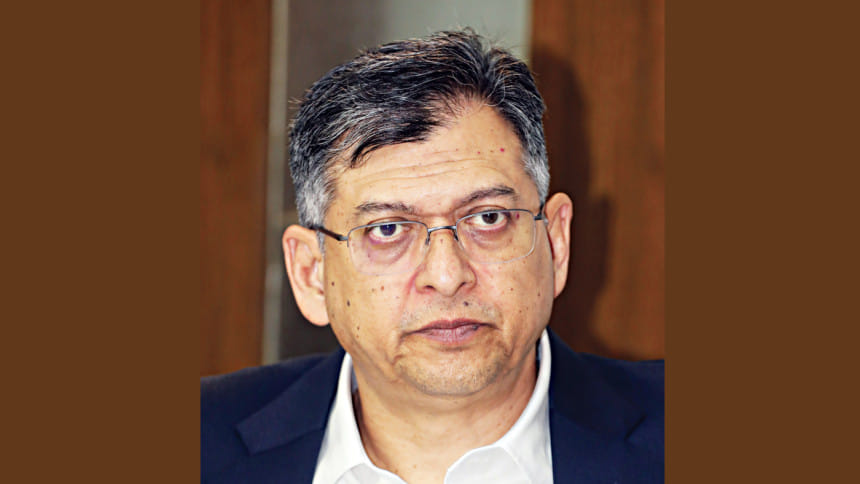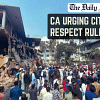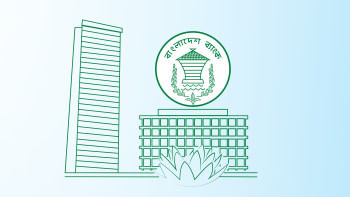There’s no need for constituent assembly

It has been seven months since the interim government took office. During this time, the caretaker administration has been working to revive the political process and strengthen state institutions. Meanwhile, participants in the July uprising have floated a new political party.
Against this backdrop, Wasim Bin Habib and Sajjad Hossain of The Daily Star recently sat down with Salahuddin Ahmed, a standing committee member and key policymaker of the BNP, to discuss the party's views on the interim government's performance, the formation of the student-led National Citizen Party, the progress toward the forthcoming national elections, and the future of the Awami League.
The Daily Star: Chief Adviser Prof Muhammad Yunus has announced that the next national election is planned for either December this year or mid-next year. How optimistic are you about the announcement?
Salahuddin Ahmed: During our last meeting with the chief adviser, where we discussed various matters, he assured us that preparations are underway to hold the elections by December. We are quite optimistic that he will present a detailed roadmap to the nation, specifying when and how he plans to conduct the elections within that time frame.
As the constitutional authority, the Election Commission is responsible for holding the national polls. In regular circumstances, at the end of the tenure of an elected parliament, the Election Commission can independently carry out this constitutional responsibility. However, due to the exceptional nature of the current situation, the Election Commission will need to rely on the interim government to act in this regard.
TDS: Are you seeing any visible initiatives from the government towards holding the elections within the time frame?
SA: A few days ago, I mentioned at an event that people want to see visible steps towards holding the elections by December. So far, the chief adviser has only stated that a dialogue process has begun under the leadership of the National Consensus Commission. This dialogue has a specific time frame, and within the time frame, they aim to establish a broader consensus. This will require several months.
The first meeting, held on February 15, may be termed the first visible step. By now, they have provided us with reports (of the reform commissions), which we are currently reviewing. There will be a subsequent meeting, where we hope to share our opinions. The government may also seek suggestions from other political parties, democratic and social forces, and experts.
We have already emphasised the need for implementing the recommendations that are crucial, feasible, and will ultimately pave the path towards the election.
We have urged them to identify the proposals that can be implemented on an urgent basis. Since reforms are a continuous process, much of it will need to be addressed by an elected parliament, where detailed discussions could be held to arrive at decisions.
TDS: What is your perspective on these reform proposals?
SA: Each of the major reform proposals requires in-depth analysis. We will prepare detailed opinions on the reports of six major reform commissions and present them to the nation. And the reforms will be implemented on the basis of national consensus. The goal is to build a strong democratic state and establish a discrimination-free society aimed at economic emancipation -- a vision we have already outlined in our proposals. This is not something we introduced after the fall of the fascist regime.
The interim government can initiate the reforms, but implementing consensus-based reforms requires significant time. That is why we are continuously pursuing them to expedite the transition to a democratic process so that an elected government can be formed and a national parliament can be established where all necessary discussions on reforms could be held and a greater consensus over the reform proposals could be made. However, they are yet to do the expected job.
Meanwhile, some political parties and groups are seemingly trying to delay this process. The purpose and expectation of the mass uprising -- which led to the fall of fascism -- was to achieve one goal: remove undemocratic forces permanently and establish a strong democratic nation by carrying out reforms in the constitution and all other state institutions.
This goal cannot be achieved through holding local government elections. Therefore, we believe that those pushing for local government elections first intend to delay the transition to a democratically elected political government.
TDS: What is your take on the newly announced student-led political party, the National Citizen Party (NCP)?
SA: We welcome any political party with a democratic nature that enters the political arena. We believe in democratic politics because our party's founder, the martyred President Ziaur Rahman, was the proponent of multi-party democracy. We have welcomed them. We always hope for a participatory political environment. Beyond that, we have no immediate reaction. They will conduct their activities based on their ideology and strategy. However, we hope they will play a role in establishing a stable political government through national parliamentary elections as soon as possible. That is our expectation.
TDS: Leaders of NCP have spoken about a Constituent Assembly and a Second Republic. You have said that those advocating for these ideas are either knowingly or unknowingly prolonging the existing undemocratic structure. Could you explain this further?
SA: Let me start with the Constituent Assembly first. A Constituent Assembly is only necessary when a new state is created with no written constitution. So, to draft a new constitution, a Constituent Assembly is needed in that newly-born country. To prepare a draft of the constitution, a drafting committee is formed. For example, a Constitution Drafting Committee was formed after the creation of Bangladesh. Similar committees were formed in India and Pakistan as well after their independence. Dr Kamal Hossain was the chairman of the constitution drafting committee in Bangladesh. The job of the Constituent Assembly is to draft a constitution, which will then be adopted.
Now, do we have any context for a Constituent Assembly here? We are already an independent country -- a sovereign, independent state -- and we call ourselves a democratic state. However, the question arises as to whether we truly are a democratic state, as our democracy has been compromised by the past fascist regime on their behalf. Country comes first, then sovereignty and the state, and only after that comes democracy. Now, I am not sure if the new political party that brought forth the idea of this Constituent Assembly truly understands this. They have submitted extensive proposals to the Reform Commission for constitutional reform, and so have we and other parties. There will be discussions on those proposals, and through comprehensive deliberations, a democratic amendment to the present constitution will be made. And it is the work of the parliament. I think there has been some overlap in their thinking between the work of the parliament and the work of the Constituent Assembly. Because the parliament makes amendments to the constitution while the Constituent Assembly is tasked with drafting and adopting a new constitution in a newly born country. We are already in a "self-determined nation state" with a constitution, but we cannot fully accept it because its democratic nature has been altered by an autocratic regime. That's why a measure democratic amendment to the constitution is required again.
Meanwhile, the honourable High Court has already scrapped several provisions of the 15th amendment to the constitution. It, however, kept several provisions for the next parliament to consider and recognised that parliament is the proper forum to amend the constitutional provisions. It's our commitment to have the existing constitution amended as per the people's desire and the aspirations of the July uprising.
The political party led by students wants a new constitution through the Constituent Assembly. At the same time, they are also saying that they have made proposals for constitutional amendments. These are self-contradictory statements. If they have proposed a major constitutional amendment, as we have, and others have as well, then a parliament will be required to consider those, not the Constituent Assembly.
TDS: What about the Second Republic?
SA: We are already a republic established through the 1971 Liberation War. It is not desirable to undermine the republic, which we earned at the cost of a long and arduous liberation struggle. A republic can be formed by having an independent state, and we have an independent state and a republic that has been established through the formulation of a constitution. The essence is that a republic functions through elected representatives, chosen to express the will of the people. These representatives are elected and replaced through subsequent elections. This is a republic where the head of state is either elected or a nominal head of state. We already have such a republic.
Now the question arises: Is our republic still in the same state as the first one we established? I would say that there have been changes. The first republic was fundamentally altered in 1975 through the introduction of BAKSAL (Bangladesh Krishak Sramik Awami League) following the Fourth Amendment to the Constitution. However, that republic was restored in 1979 through the Fifth Amendment. President Ziaur Rahman reintroduced multi-party democracy and replaced the parliamentary system with a presidential system of governance. In 1991, we shifted to a parliamentary system [Westminster type of government] again. In 1996, we introduced a neutral caretaker government provision for having free and fair elections. But we cannot term all those major changes in constitution as a new republic each and every time.
Presently, we have made extensive reform proposals for the independence of the judiciary. Through these amendments, the original and democratic nature of the republic could be restored. The nature of the republic will be democratic, and the constitution will be amended according to the aspiration of the people. If we want to call this the Second Republic, this is anyone's liberty. But a republic is a republic. We can bring back the democratic nature of the republic through constitutional reforms in the future, but that does not mean we call it a new republic, a second or third republic, and so on each and every time the constitution is amended.
TDS: The distance between BNP and Jamaat is now quite noticeable. Why has this gap widened? Has BNP organisationally been harmed by forming an alliance with Jamaat?
SA: The political party you are referring to has its own ideology, and they have their own strategy in relation to the upcoming elections. They will proceed with their own approach and continue their ideology-based politics.
It's quite common in many countries for various political forces to form alliances before elections. However, the formation of an electoral alliance with them is not on our discussion table right now. Instead, we can contest the elections by forming alliances with those who were part of our simultaneous movement against fascism. And if, in the future, the people entrust us with the responsibility of governing, we will implement our reform proposals through the formation of a "government of national unity" with them.
With regard to the question of whether we were harmed organisationally due to the alliance, I would say one thing: In politics, various strategies are applied at different times for political movements, struggles, and elections. The question of gains and losses is ultimately determined by history and the people of the country.
TDS: There has been a discussion about banning Awami League. What is your opinion? Do you want the Awami League to participate in the upcoming elections?
SA: The mass killings during the July uprising were carried out as per the Awami League's political decision and under the orders of the party chief, fascist Sheikh Hasina, who was an illegitimate prime minister at the time. The Awami League is organisationally responsible for crimes against humanity, massacre, and mass killings. In line with this, the student organisation of the Awami League has already been banned under a specific law. Now, the question arises whether the Awami League itself, as a political organisation, should be brought under judicial proceedings for genocide and crimes against humanity. This is a demand of the people, and the government must decide on this matter. Now, the ball is in the court of the interim government.
Fascist Sheikh Hasina, her ministers, MPs, and the political leaders of the Awami League—who are responsible for genocide and crimes against humanity—must be brought to justice and face trial. The issues of whether the Awami League could do politics and elections in Bangladesh would be decided by the people of the country. The government also has responsibility here.
TDS: The interim government has now completed seven months in office. What is your comment on the government's performance?
SA: Seven months is a sufficient period to assess a government's performance. Our overall assessment is that, due to inexperience, this government has failed to meet public expectations, even after these seven months. People had expected that commodity prices would come within their purchasing capacity, law and order would give them a sense of security, and the market situation and political situation would stabilise. However, the government could not handle any of these areas successfully or control the situation effectively. Perhaps they took charge of the government on the ruins of a collapsed system. Or perhaps their lack of experience played a role in this. However, we have always cooperated with them and will continue to do so. We expect that they will govern properly for the remaining days of their term through discussions with all relevant stakeholders, ensuring that their actions align with public expectations.
TDS: According to Ain o Salish Kendra's report and media reports, 40 BNP leaders and activists have been killed in the past seven months due to internal conflicts. At the BNP extended meeting on February 27, the acting chairman issued strict directives against such conflicts. Despite that, clashes have occurred in several districts. What is your view on this?
SA: I have doubts about how credible this statistic is. However, political rivalries do exist in a large political organisation. As the elections approach, this kind of competition and rivalry can be seen among the supporters of various candidates. Some incidents may have happened, and those are undesirable. We are making efforts to control such incidents with firm hands, and our efforts will continue.
There have been allegations that some leaders and activists are involved in extortion. We have investigated many cases. In our findings, it appears that those involved have no real connection to the BNP or any political party. They operate like a professional extortion ring, using the names of political parties whenever it benefits them. In some cases, it's been revealed that activists of the fallen fascist Awami League and miscreants are involved in doing all these crimes with malafide intention in labelling the name of BNP. We have to say that as a party, we have become victims of this situation. At the grassroots level, out of 100 incidents, investigation reveals that in 98 percent of the cases, those involved had no direct political affiliation, but they are using the party's name for their own benefit.
TDS: Thank you very much for your time.
SA: Thank you as well.


 For all latest news, follow The Daily Star's Google News channel.
For all latest news, follow The Daily Star's Google News channel. 







Comments